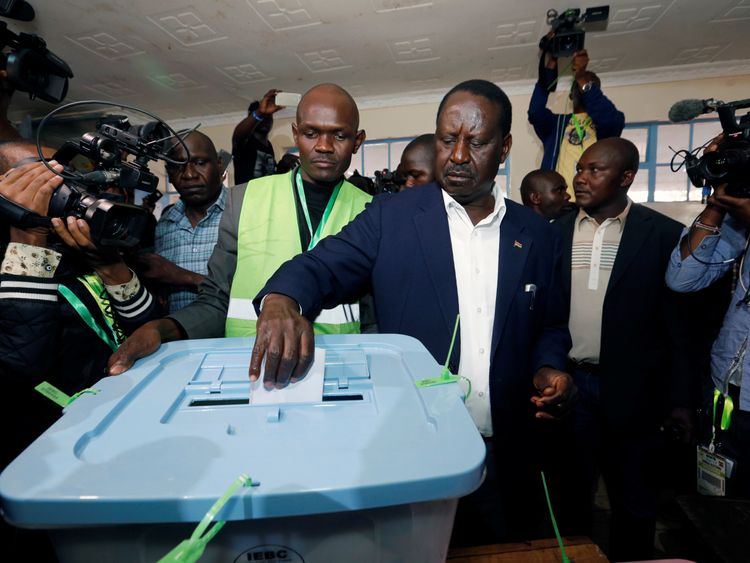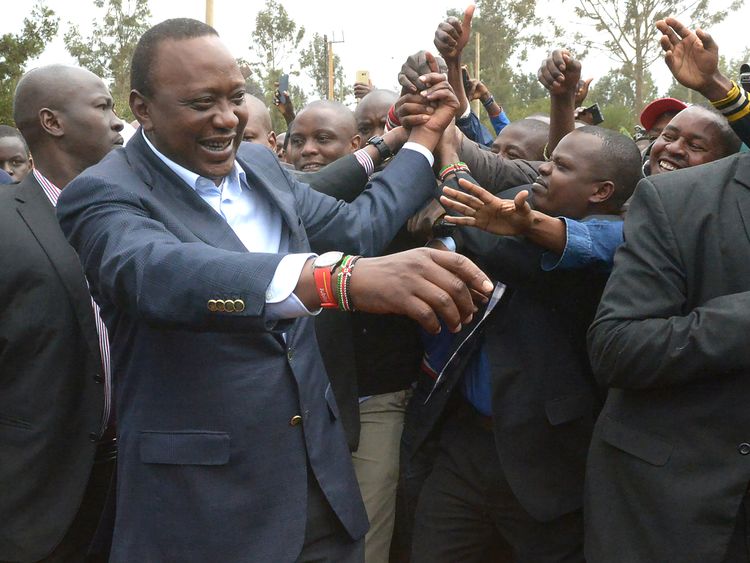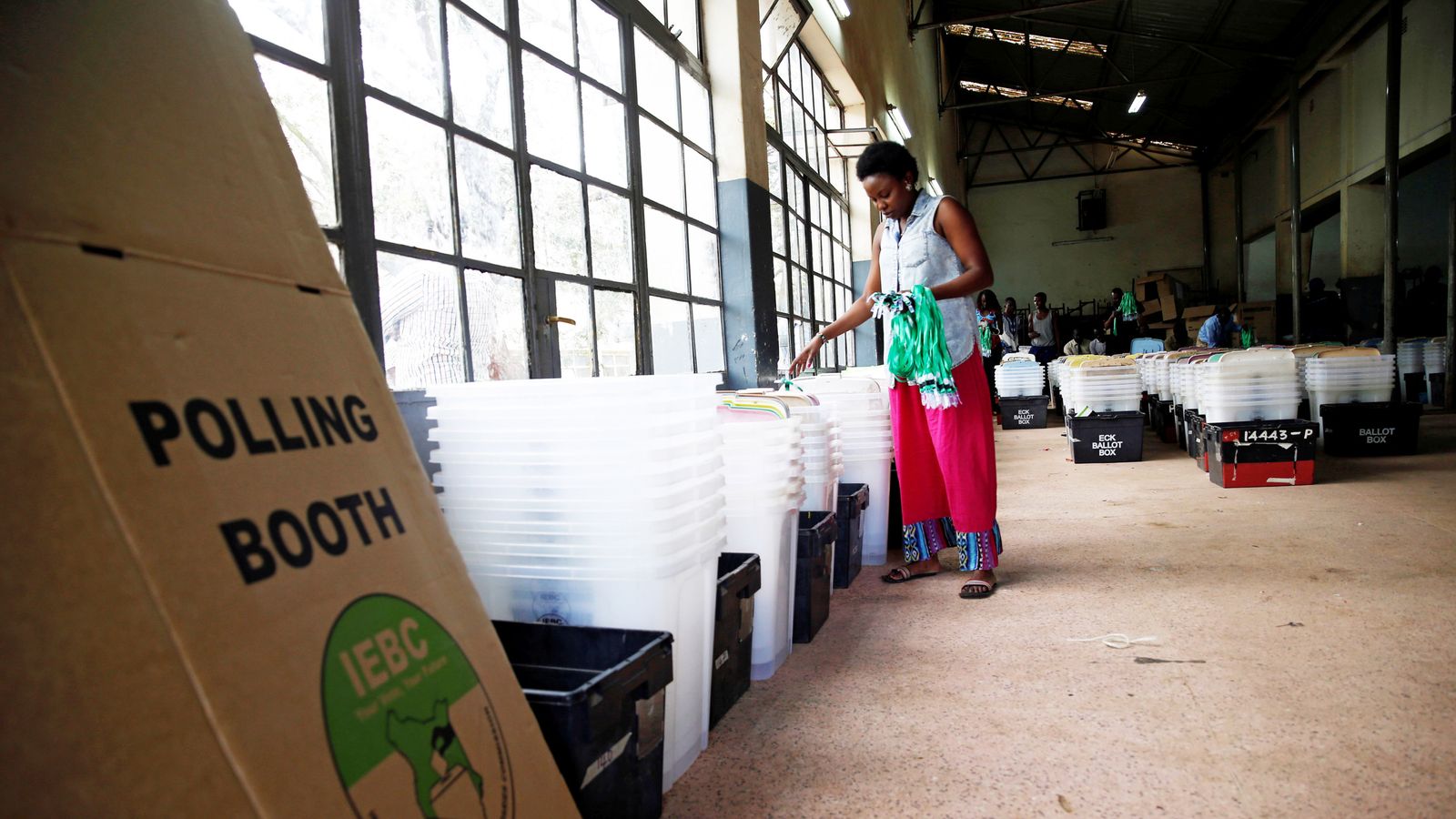Kenya vote-rigging claims by opposition leader Odinga as polls open
It is the second time President Kenyatta has run against rival Raila Odinga, with opinion polls putting the pair neck and neck.





Kenyans have been voting in presidential and general elections amid continued claims from the leading opposition candidate of vote rigging.
Raila Odinga said on the eve of the elections that he feared that 11,000 polling stations that were beyond the cellular telephone networks were vulnerable to manipulation.
His allegations centred on Electronic Voter Identification Devices (Evids) which send identification for every voter to control centres to prevent fraud.
But the use of so many outside the phone networks means this could be delayed and the potential to cheat remains.
"We see it as a deliberate attempt to do some monkey business," Mr Odinga said.
Mr Odinga and incumbent President Uhuru Kenyatta both voted on Tuesday.
Almost 20 million Kenyans have registered to vote to choose candidates for a vast array of positions from the presidency to county councillors but all eyes are on the latest battle between the former British colony's two political dynasties.
By midday there were no significant reports of irregularities.
Gladys, a mother of two queuing at the Kilimani Primary School to cast her vote, was adamant that previous election violence meant that "Kenyans had learned their lesson".
"If any candidate looses then he must accept the result. This country is bigger than one man," she said.

Mr Kenyatta, son of Kenya's first president Jomo Kenyatta, is in a neck-and-neck race with Mr Odinga. His father, Jaramogi Oginga Odinga, was Mr Kenyatta's vice president.
The ruling coalition known as the Jubilee Party may have the ethnic edge. Mr Kenyatta, who is a Kikuyu, is running with vice president William Ruto, a member of the Kalenjin tribe.
All of Kenya's presidents have hailed from either the majority Kikuyu or the smaller Kalenjin.
Mr Odinga's Luo, the second largest ethnic group, has yet to seize the top job. He managed to rise to prime minister after the 2007 elections but that post has since been abolished.

Memories of the violence that followed those elections remain fresh. As a result upmarket shopping malls and stallholders in Kibera slum are all reporting "panic buying" of food.
In Kibera, a stallholder who did not want to give his name said he remained open - to profit from the fear as even the very poor invest in essential goods.
Not least because in 2008 Kibera's market was burned to the ground while protesters fought pitched battles with armed police.
More than 1,000 people were killed in 2008 and 600,000 displaced from their homes.
This year more than 150,000 security force personnel have been deployed. And the police have been boasting of how they have brought in fleets of water cannon, armoured vehicles and tear gas to deal with any violence.
One local newspaper reported that the authorities had sent large amounts of body bags to Kisumu, the city in Kenya's far west where the Luo are a majority.
This sent Mr Odinga's Luo the signal that if there is an uprising following the results they would pay a heavy price.
The two campaigning coalitions of Mr Odinga's National Super Alliance (NASA) and the ruling Jubilee Party are almost indistinguishable in terms of policies.
Mr Kenyatta offers a slightly more conservative pro-business platform against Mr Odinga's soft left drift.
He was schooled in East Germany under communism and has joined calls for land reforms that could drive white Kenyans out of the lands they own, especially in the north of the country, but has largely focused on insisting that if he loses it will be as a result of rigging.

The final days of campaigning have been marred by the murder and torture of a top election official, opposition claims that one of its vote tallying centres was raided by police and a feverish atmosphere of conspiracy and suspicion.
Polls are so tight that turnout will be crucial to either side's success in the 48 million-strong east African nation.
Political analyst and anti-corruption campaigner John Githongo said that the greatest tensions are likely to be with any delay in announcing the results.
"Six days is allowed before the results have to be published. But taking that long is going to drive people crazy," he warned.
"Especially as both sides have convinced themselves that they are going to win and a delay will be taken as proof of rigging."
Election observers agree that the most critical aspect to the election's success is whether a biometric system of voter identification and tallying works on the day.
The tension around the electronic system reached breaking point last weekend after the poll commission's top IT manager Chris Msando was found strangled and tortured in a forest on the outskirts of Nairobi.
Then an American and a Canadian working with NASA on their poll strategy were detained before being deported.
More than 19 million Kenyans are registered to vote at over 40,000 polling stations. Voting will close at 5pm (3pm UK time).
By;Worldcoinsmoney.blogspot.com
KENYA.
Comments
Post a Comment